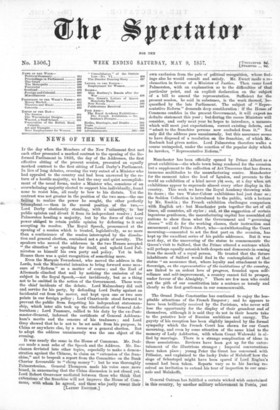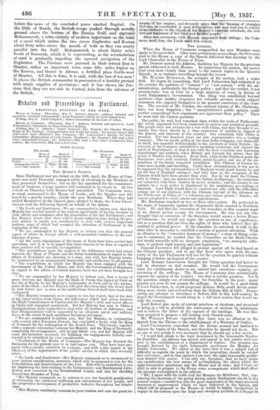NEWS OF THE WEEK.
IF the day when the Members of the New Parliament first met each other presented a marked contrast to the opening of the Re formed Parliament in 1833, the day of the Addresses, the first effective sitting of the present session, presented an equally marked contrast to the first sitting of Lord Derby's Parliament. In lieu of long debates, crossing the very outset of a Minister who had appealed to the country and had been answered by the return of a hostile majority, we had the easy and quiet accomplishment of the usual forms, under a Minister who, conscious of an overwhelming majority elected to support him individually, found none to resist him, all ready to bow to his dictate. Yet the contrast was not greater in the position of the two men—the one failing to realize the power he sought, the other perfectly triumphant — than in the moral position of the two,— Lord Derby obstinately standing, with a minority,' to bar public opinion and divert it from its independent resolve ; Lord Palmerston heading a majority, but by the force of that very power obliged to retain public opinion by deferring to it and accepting its resolve. The Royal Speech, pronounced at the opening of a session which is treated, legislatively, as no more than a continuance of the session interrupted by the dissolution and general election, contained not a grain of novelty. The speakers who moved the addresses in the two Houses accepted "the situation" as speaking for itself, and upheld Lord Palnierston as himself his own party and policy. Yet in both Houses there was a quiet recognition of something more.
Even the Marquis Townshend, who moved the address in the Lords, took the Ministerial intention to bring forward some measure of " Reform " as a matter of course ; and the Earl of Albemarle clinched that nail by noticing the omission of the subject in the Royal Speech,—not invidiously, but as a thing not to be omitted in the action of the Government. These were the chief incidents of the debate. Lord Malmesbury did suit and. service for his party, by defending Lord. Derby against an incidental cut from the mover, and kept open one or two sore points in our foreign policy ; Lord Clanricarde stood forward to prevent the public from forgetting his independent statesmanship, which inter alia took up the vindication of General Ashburnham ; Lord Panmure, rallied to his duty by the ex-Postmaster-General, indorsed the certificate of General Ashburnham's merits and the censure of his traducers; and Lord Grey showed that he is not to be set aside from his purpose, in China or anywhere else, by a recess or a general election. But to adopt the address unanimously was the one object of the evening.
It was nearly the same in the House of Commons. Mr. Dodson made a neat echo of the Speech and the Address. Mr. Buchanan deviated into other topics, especially to make a demonstration against the Chinese, to claim an "extension of the franchise," and to bespeak a report from the Committee on the Bank Charter favourable to "cheap money " : but he was thoroughly Palmerstonian. General Thompson made his voice once, more heard, in announcing that the China discussion is not closed yet. Lord Robert Grosvenor mediated between those who think that extensions of the franchise will not improve the House of Commons, with whom he agreed, and those who justly resent their [Le.rzsr EDITION.] own exclusion from the pale of political recognition, whose feelings also he would consult and satisfy. Mr. Ewart made a reclamation in favour of a Minister of Justice. Then eame Lord Palmerston, with an explanation as to the difficulties of that particular point, and an explicit declaration on the subject of a bill to amend the representation. Sufficient for the present session, he said in substance, is the work thereof, bequeathed by the late Parliament. The subjeot of "Representative Reform" demands deep consideration : if the House of Commons confides in the present Government, it will expect no definite statement this year ; but during the recess Ministers will consider, and. early next year he hopes to introduce, a measure which will most just expectations, correct existing defects, and "admit to the franchise persons now excluded from it." Not. only did the address pass unanimously, but this assurance seems to have disposed of a resolution on the franchise, of which Mr.. Roebuck had given notice. Lord Palmerston therefore walks a course unimpeded, under the sanction of the popular deity which he invokes, "Representative Reform."
Manchester has been officially opened by Prince Albert as a groat exhibition—the whole town being rendered for the occasion but a supplement to the collection of Art Treasures that has drawn immense multitudes to the manufacturing centre. Manchester for the moment takes the lead of London, and presents to the world an exhibition of a kind never y'st seen, at a day when art exhibitions appear to supersede almost every other display in the country. This week we have the Royal Academy throwing wide its doors ; the two Water-Colour exhibitions had just done so;. the Seddon Collection is introduced to the public, with a lecture by Mr. Ruskin ; the French exhibition challenges comparison with English art : but Manchester puts together the art of all times, all countries, all styles ; and, at the suggestion of certain ingenious gentlemen, the manufacturing capital has assembled all nations to show them what the Government and "governing classes" will do for the working classes, their instruction and. amusement ; and Prince Albert, who—notwithstanding the Court mourning—consented to net the first part on the occasion, has kept up the excellent series of his public addresses. But it was next day, at the uncovering of the statue to commemorate the Queen's visit to Salford, that the Prince uttered a sentence which will perhaps equally astonish both despots and democrats in coming from the mouth of a royal person. He trusted that the future inhabitants of Salford would find in the contemplation of that statue "an assurance that, where loyalty and attachment to the Sovereign, as the representative of the institutions of the country, are linked to an ardent love of progress, founded upon selfreliance and self-improvement, a country cannot fail to prosper, under favour of the Almighty." There are few men who could put the pith of our constitution into a sentence so tersely and clearly as the first gentleman in our commonwealth.
The Grand Duke Constantine has continued to enjoy the hospitable attentions of the French Emperor ; and he appears to have been brilliantly received by the Parisians, who never will lose the opportunity for the display of their grandeur and of themselves, although it is said they do not in their hearts take to the putative heir of Russian ambitions and energy. The gayety of his reception has been slightly impaired by the formal sympathy which the French Court has shown for our Court mourning, and even by some attention of the same kind to the memory of Lady Ashburton, with whom Count Walewski is allied by marriage. There is a strange complication of ideas in these associations. Reviews have been got up for the entertainment of the illustrious stranger ; Imperial conversations have taken place ; young Peter the Great has conversed with Pelissier, and explained to the lucky Duke of Malakoff how the siege of Sebastopol might have been spared if Lord Raglan's counsel had been taken. Reports vary as to his having received an invitation to extend his tour of inspection to our arsenals and Malakoffs.
General Ontram has fulfilled a certain wicked wish entertained in this country, by another military achievement in Persia, just
before the news of the concluded peace reached Bagdad. On the 26th of March, the British troops pushed through marshy ground above the bottom of the Persian Gulf, and captured Mohammorah, a town entirely of modern importance on the bank of a canal which unites the two rivers Euphrates and Kooran about forty miles above the mouth of both as they run nearly parallel into the Gulf. Mohammorah is about thirty miles South of Bussorah, which it is superseding, as the accumulation of sand is gradually impeding the upward navigation of the Euphrates. The Persians were pursued in their retreat first to Shuster, rather an important town some fifty miles higher up the Kooran, and thence to Ahwaz, a fortified place Northwest of Shuster. All this is done, it is said, with the loss of ten men ! It places the British commander in possession of a healthy ground with ample supplies of provisions ; and it has shown the Persians that they are not safe in Central Asia from the advance of the British.



























